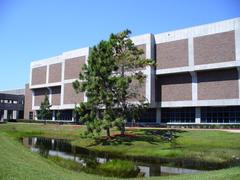
St. James Building Jacksonville: Visiting Hours, Tickets, and Historical Site Guide
Date: 04/07/2025
Introduction: Why Visit the St. James Building?
The St. James Building in Jacksonville, Florida, is an architectural and civic icon, representing resilience, innovation, and the city’s enduring spirit. Rising from the devastation of the 1901 Great Fire, the building was designed by Henry John Klutho and completed in 1912 as a pioneering example of Prairie School architecture. Originally built as the Cohen Brothers Department Store, it quickly became a symbol of Jacksonville’s economic revival and urban sophistication (Visit Jacksonville; SAH Archipedia). Today, following meticulous restoration, it serves as Jacksonville City Hall and stands as a must-see Jacksonville historical site for architecture enthusiasts, history buffs, and travelers alike.
This guide provides a comprehensive overview of the St. James Building’s history, architectural significance, visiting hours, tours, accessibility, and practical tips to ensure you make the most of your visit.
Table of Contents
- The Origins and Early History
- Architectural Significance: Prairie School Masterpiece
- The Cohen Brothers Era
- Decline and Restoration
- Current Role and Visitor Experience
- Visiting Hours, Tickets, and Tours
- Key Architectural Features to See
- Accessibility and Visitor Services
- Nearby Attractions in Downtown Jacksonville
- Frequently Asked Questions (FAQ)
- Conclusion: Plan Your Visit
- References
The Origins and Early History
The St. James Building’s story begins in the aftermath of the 1901 Great Fire, which destroyed more than 2,300 buildings in Jacksonville, including the original St. James Hotel. As part of the city’s ambitious rebuilding efforts, the Cohen Brothers, prominent merchants, acquired the site and commissioned Henry John Klutho, a young architect influenced by the Chicago School and Prairie School movements, to envision a new commercial palace (Visit Jacksonville; SAH Archipedia).
Klutho’s design broke from convention, embracing new materials, open layouts, and an architectural philosophy that harmonized with the environment. The building, which opened in 1912, quickly became a symbol of Jacksonville’s rebirth and modernity.
Architectural Significance: Prairie School Masterpiece
The St. James Building is widely celebrated as one of the finest examples of Prairie School architecture in the southeastern U.S. Inspired by the work of Frank Lloyd Wright and Louis Sullivan, Klutho incorporated features such as:
- Strong horizontal lines
- Flat, overhanging eaves
- Integration with the environment
- Rich terra cotta ornamentation with natural motifs
Occupying an entire city block, the building’s most iconic feature is its 75-foot octagonal glass dome, which floods the central atrium with natural light. Terra cotta details, designed and approved by Klutho, highlight abstract seashells and native plants, reflecting Florida’s unique landscape (Waymarking).
The Cohen Brothers Era
For over seven decades, the building housed the Cohen Brothers Department Store, making it the largest in Jacksonville and the ninth-largest in the U.S. at its peak. The store was more than just a retail destination—it was a social and civic hub, hosting events, celebrations, and community gatherings. The department store era lasted until changing retail trends led to its closure in 1987 (Waymarking).
Decline and Restoration
After its closure, the building faced neglect and the threat of demolition. Recognizing its architectural and historical importance, the City of Jacksonville purchased the St. James Building in 1993 as part of the River City Renaissance plan (Digital Commons UNF). A major restoration completed in 1997 revitalized the structure, faithfully reconstructing the central dome, restoring terra cotta details, and updating infrastructure for modern use (Wikipedia). The project became a model for historic preservation and adaptive reuse.
Current Role and Visitor Experience
Now functioning as Jacksonville’s City Hall, the St. James Building is the seat of municipal government, hosting the Mayor’s office, City Council chambers, and public meetings. It remains accessible to visitors who wish to admire its architecture, attend civic events, or learn about Jacksonville’s heritage. The building’s central rotunda, crowned by the stunning stained glass dome, is a highlight for all who enter (DTJax; EAA Jacksonville Architecture).
Visiting Hours, Tickets, and Tours
- Hours: Monday–Friday, 8:00 AM to 5:00 PM; closed weekends and public holidays (DTJax).
- Admission: Free; no tickets required for general entry.
- Guided Tours: Offered by appointment, especially during historic preservation events. Contact City Hall or check the city’s website for schedules (GPSmyCity).
- Accessibility: The building is fully ADA compliant, with elevators, ramps, and accessible restrooms (CIL Jacksonville Events).
- Photography: Permitted in public areas; avoid flash and respect posted restrictions.
Travel Tip: Arrive in the late afternoon for fewer crowds and optimal photography. Bring photo ID for security screening.
Key Architectural Features to See
- Central Atrium & Glass Dome: The dramatic octagonal skylight is the building’s centerpiece, reconstructing Klutho’s original vision with over 100 panels of colored glass.
- Terra Cotta Ornamentation: Examine the intricate Sullivanesque motifs around the entrances and cornices (Waymarking).
- Open-Cage Elevators: Restored elements of early 20th-century engineering and design.
- Historic Murals and Fixtures: Surviving period details and interpretive displays highlight the building’s rich history (Library of Congress).
Accessibility and Visitor Services
- Entrances: Main access is on Duval Street, with additional entries on Hogan and Laura Streets.
- Services: Information desks, accessible restrooms, and elevators are available.
- Security: Standard screening applies; check in at the front desk.
Nearby Attractions in Downtown Jacksonville
The St. James Building’s central location makes it an ideal starting point for exploring Jacksonville’s historical and cultural scene. Notable nearby sites include:
- James Weldon Johnson Park: Vibrant public space with events and food trucks.
- Museum of Contemporary Art Jacksonville (MOCA): Modern art exhibitions.
- Jacksonville Main Public Library: Architectural and literary interest.
- Laura Street Trio and Florida Theatre: Historic buildings and performance venue (Travellemming; Wanderlog).
Frequently Asked Questions (FAQ)
Q: What are the St. James Building visiting hours?
A: Monday–Friday, 8:00 AM to 5:00 PM.
Q: Is there an admission fee or are tickets required?
A: No, admission is free and no tickets are needed for general entry.
Q: Are guided tours available?
A: Yes, by appointment or during special events.
Q: Is the building accessible for those with disabilities?
A: Yes, the building is fully ADA compliant.
Q: Can I take photographs inside the building?
A: Yes, in public spaces; please avoid flash and follow any posted restrictions.
Q: What else can I do nearby?
A: Visit MOCA, the public library, James Weldon Johnson Park, and other downtown landmarks.
Conclusion: Plan Your Visit
The St. James Building is more than a preserved relic—it is a living testament to Jacksonville’s resilience, creativity, and civic pride. Whether you’re passionate about architecture, fascinated by history, or simply exploring the city, this Jacksonville historical site offers an inspiring and accessible experience. Take advantage of free admission, convenient hours, and a central location to discover the best of Jacksonville’s cultural heritage.
For the latest updates on tours, events, and accessibility, visit the City of Jacksonville website. Enhance your visit with the Audiala app for guided tours, and explore other nearby attractions to make the most of your downtown Jacksonville adventure.
References and Further Reading
- Visit Jacksonville
- SAH Archipedia
- Waymarking
- Digital Commons UNF
- DTJax
- EAA Jacksonville Architecture
- CIL Jacksonville Events
- GPSmyCity
- Wikipedia
- Library of Congress
- Travellemming
- Cowart.info
- Wanderlog





